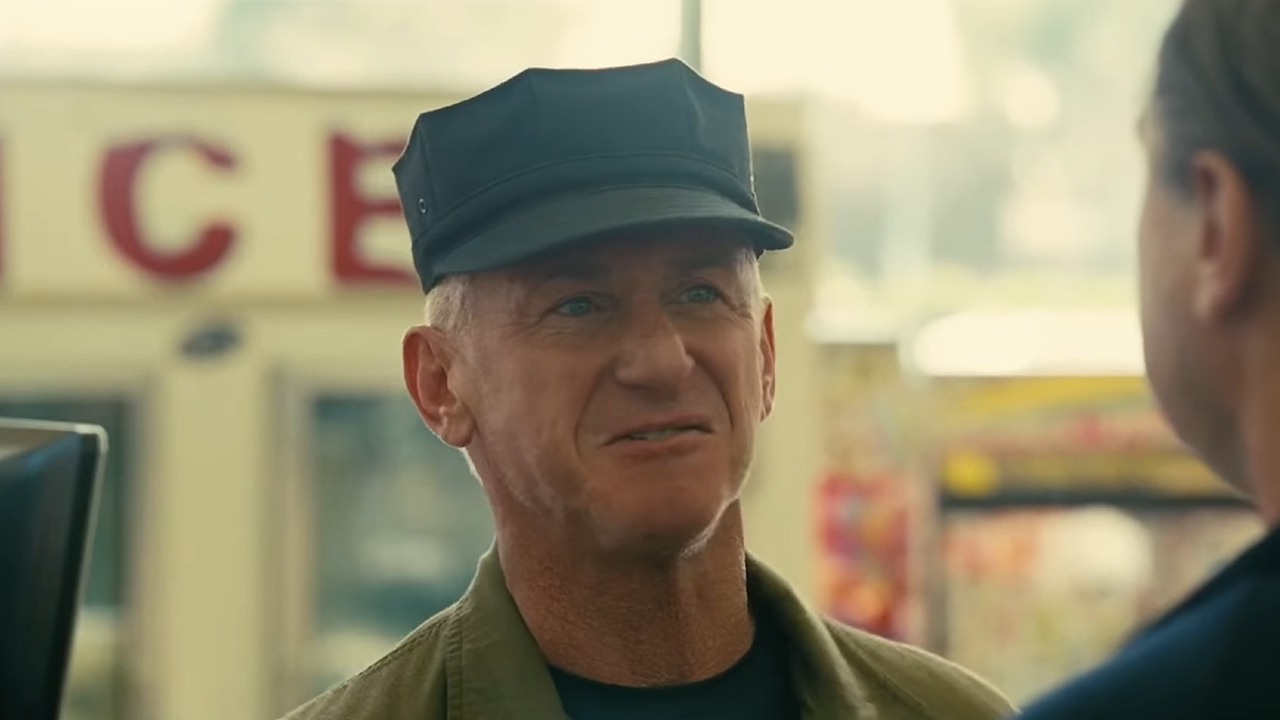Interview: Cowboys & Aliens Director Jon Favreau

There are few directors that I’ve had the pleasure of talking with that are more passionate about their work than Jon Favreau. Over the course of production on Cowboys & Aliens, I’ve had a chance to sit down with the filmmaker two previous times and with each instance he’s given the impression that he simply loves to sit down and talk about film. The same held true two weeks ago when I had the chance to speak with him as part of a roundtable interview in beautiful Missoula, Montana.
While cowboys herded steer in the background, myself and a group of other journalists sat down with the Cowboys & Aliens director to talk about the filmmakers new movie. Check out the interview below in which Favreau talks about developing the film’s cinematography, how the script changed when Daniel Craig came on to replace Robert Downey Jr. and how the film was pitched to Harrison Ford.
At what point did you make the story decision to not know yourselves out doing things like developing a language for the aliens that would be subtitled, developing characters within that organization, letting us know about their hopes or dreams or aspirations, and just going with mysterious monsters?
Look, the title's Cowboys & Aliens, so you can get away with a lot if you chose to. You could make it the union of Cowboys Movies and Alien Movies and done whatever was convenient at any given moment. I think that's what most people would do, especially if you went broader and more comedic. Do whatever's the most fun in the moment. We really wanted to challenge ourselves with making it the intersection of the two genres. It had to work for both. If it only worked for one, we booted the idea. So you'll see a lot of the set pieces feel like they could be in a western. We tried to echo what would be in the western; the scale of it. We didn't want [the action] to feel much bigger than a cavalry charge or the Alamo. We didn't want it to be a huge, huge alien invasion battle. We wanted to keep that same texture.
So, in answering your question, the first thing we had to set out and do was decide what kind of western we were going to do, if it was just a western, and what kind of alien movie. The type of alien movie we seized on was --I guess because of when I grew up -- the moment just before CGI hit. There was, I think, a golden age of that kind of movie because you were dealing with animatronics, you were dealing with the Stan Winston/Bottin era of The Thing, Alien, and even Aliens and we really looked and examined closely what was done right before you could do everything with a computer. I think once Alien 3 came out, you just should them swimming and it was just a different ... you were showing off the technology. I know with Iron Man, it worked very well because we looked at Top Gun when we looked at how to cover him flying. We looked at what the last big practical flying movie was to see the way you cover it, what lenses you use, how to discipline the cinematography. Not because anybody would notice it overtly, but subconsciously you feel it's more real. So we decided to look at films like Alien, Aliens, Predator, and even Jaws, Close Encounters, a lot of the Spielberg stuff that play up the tension. In those movies, you played on the verge of horror and spent less time explaining the culture of that because you want to keep them this distant, evil, shadowy, primal force.
And then as you slowly reveal them and make them vulnerable. Then you think of the way that Predator plays out, you don't even see the thing. It's a shadow, then it's a ripple, it's a movement, music, sound, and then the aftermath of what it does and eventually, the armor comes off, you see it, and then they end up fighting. If that happened earlier in the film, you'd lose people. Although we have our own internal logic of how it works, the way the technology works, why they do what they do, it would never be obvious to these people and we just reveal as much as we need to allow the characters to be able to face them. I could talk for a half an hour about why they travel in the type of craft they do, what type of creatures they are, how they were developed, what other creatures exist where they're from, what they're there for, why they're there, and try to cite the mythology of alien encounters way back to Egyptian pyramid times and those shared understandings of why aliens might come here. We tried to maintain some internal logic, though in the film, we don't want to burden the audience with that, but we wanted to create a consistency for ourselves.
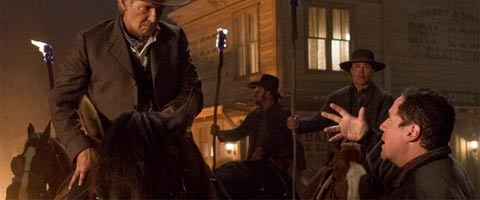
Were you really paying a lot of attention to selecting different stocks and using different techniques? How much did you and Matthew Libatique talk about that?
Your Daily Blend of Entertainment News
A lot. The minute we decided to go with film, and we tested digital 3D -- just for the record, I love 3D, I have nothing against it, I think it's here to stay, I can't wait to work in 3D and I was compelled by the test, but it has to serve the story. Just like casting, just like performances, dialogue, everything has to serve the story, otherwise you're being indulgent. Also, I felt there was a lot of pressure with everyone rushing to do 3D, I felt like, tactically, at the end of a summer when everything is in 3D, maybe even things that shouldn't be, and everything is of a similar genre, and everyone is exploring the same types of stories and sequels and reboots that it would make this movie even more fresh. At the end of a summer where people are just bottlenecked with movies every weekend, it was a great opportunity to do something that might pop and be refreshing. I feel even more strongly about it now.
That being said, once we decided to go with film, which you can't do if you're shooting native 3D. It's not feasible, you either have to shoot digital or convert film. Once we decided to shoot anamorphic, which I don't think Matty had done before, nor had I, we were really embracing what the film could do and there were going to be both flashbacks and also a decision about what the alien vision should look like and we looked at a lot flashback stuff from the westerns. Flashbacks occur in both [genres], that's one of those intersection moments if you look at Fire in the Sky and you look at when people remember alien encounters or abductions, they have spotty memories with it ... even Men in Black. And if you look at Once Upon a Time in the West or The Wild Bunch, there's great use of flashback. So, we wanted to create a language that would work for both. Matty had done some reversal work in Inside Man I believe. So we worked tests of it because we didn't just want to go with vignetted, sepia wash.
We didn't want anything to ever feel kitsch. We didn't want it to feel like a wink about the Western. We wanted to do something that made you feel like what you saw, but we didn't want it to be a pastiche. So reversal felt like it gave it an otherworldly quality. It sent a message to the audience that you were looking at something different. It became challenge with visual effects in the flashback, because it already makes it look unreal, so to have the different things that we had do became more challenging because even if you showing something real in reversal, it feels a little unreal. That was only challenge and Matty was really the steward of that and he has a great aesthetic eye ... even to the point of working on the Hipstomatic freepak that we did as a tie-in for iPhone people. Even on that, he was instrumental on creating an aesthetic for it. I think it really works quite well in the film.
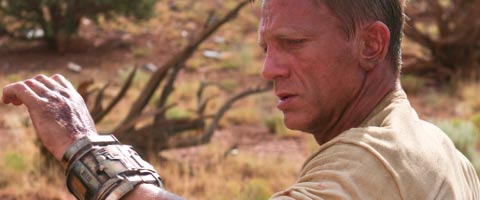
Before Daniel Craig was cast, Robert Downey Jr. was attached to the film. How much did the script change between actors?
When I read the draft of the script that I was show, I met with ... Just the whole history of this: at first, I first heard about it when it was announced. It had been picked up before the comic book had ever been written. I think it was just an image, I don't think it even had a title. It was very compelling. Years later, when we were shooting Iron Man, Fergus and Otsby, the writing team that I developed the John Carter of Mars script with and then brought them onto work on Iron Man when that didn't pan out, they had a meeting with Steven about Cowboys & Aliens, which I was like, "Really? Wow! Tell me about it." They got hired, then I didn't hear about it. Then in Iron Man 2, Robert said, "Yeah, I might be doing, with Fergus and Otsby, Cowboys & Aliens. Now I was really curious about it. Didn't really hear much about it again. Then, finally, when I was at Comic-Con promoting Iron Man 2, I ran into Kurtzman and Orci, who are the producers and wrote the latest draft. They were just talking to about getting together and meeting and I was curious, still. I said tell me about the draft and they said, "Oh, we just finished the draft. Come on over."
They sent me the draft and it was really strong. The only thing that was a little off for me was that the main character was a little chatty. The gag has to be that you play one straight and the other straight and then let it get crazy when they come together. Don't play a funny western. Don't have a fast talking gunfighter. Then it becomes a different thing; then that's the comment. That's the fun you're having. That's the twist, but you don't want a twist before the aliens come, I felt. Then, also, Sherlock had taken off and [Robert] was in two franchises now, so he couldn't do because Sherlock 2 was going to be shooting in the same window. By the time I had come on as a director, he was already drifting, so the first person I cast when I came in was Daniel, who I really liked. There's not a lot of people who can play this role. Most people his age feel more like kids. They don't feel like guys who've experienced enough to feel remorse and need redemption. They feel like people who are just coming of age. He had that history to him and he was a real good foil. Then we got Harrison and it really made a lot of sense.
Talk a little bit about getting Harrison in. How do you go to him and pitch Cowboys & Aliens?
It was a little more surreptitious then that whole thing. We were already going through lists of actors and he was somebody who, when we first discussed it, the people who knew what he was up to and what he had been doing said that he was not going to be into it. He's not going to be looking at doing a supporting role. There was a myriad of reasons we never went out to him. Then, through mutual contacts, I found out that people asked "why didn't you go to Harrison?" I said it was not a realistic thing. To be honest, when you're dealing with a movie of this size and dealing with stars, you don't want to start sending scripts to people and getting passed on it. Then next thing you know, people might start feeling like a second choice or the movie might lose momentum. It's a very small, weird, gossipy town and you have to be very decisive when you make movies to set things up because you don't want to insult anybody.
So we didn't want to do that, we were hurrying up. It also takes several weeks sometimes to get an answer. Then I heard from somebody who was close to him saying this might be something. He's looking to work with filmmakers like you on interesting projects. So, I said if this is a realistic possibility, then this is the best news ever, but it can't turn into... sometimes you're encouraged to make offers because it makes the representatives look good, even if they know they don't want it, but say "Look, I go you five offers!" So they might give you a false positive, so I didn't know where this was coming from. When I later talked to his representatives, who I'd known for many years, it was pretty clear that they could get a quick answer and see if it was something he'd be into.
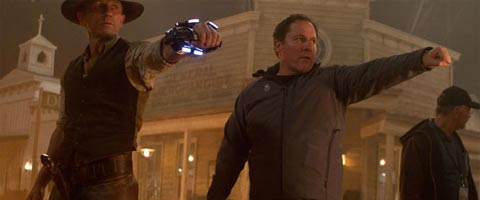
So I said all right, we got the script over to Harrison. Very quick turnaround: read it and sat down and met with me. Now all this talk now of "I read it, I didn't like it," he never said any of that to me in the beginning. I knew that he was a guy who was very scrutinizing and was very ... you guys sit down with him. First of all, you're sitting across from Harrison Ford, which, even if he was the warmest, even if he was Santa Claus ... but he is standoffish at first and he's a man of few words and he has his own rhythm to him. He asked a few questions and me and Bob Orci were there. We were just happy to meet the guy even if it didn't work out. This is going to be a story forever. I would've been talking about it in the junket whoever was playing that role. Then he started to ask more and more questions and as we answered them, I think he saw our enthusiasm and I walked him through all the drawings that I do and from Iron Man that you've got to do drawings that reflect the mood of every scene and every moment. With Iron Man, we didn't always have pages. Sometimes, it was a drawing that I'd hang up at the monitor and say "Okay, here's Tony's workshop, this is the feeling I want when you're working on a half-built suit. You've been shot out of the sky." The words changed so much in that movie; it was always the image that I could show my DP, I could show the actor.
I had a lot of those for the mood of the town with lanterns as people were coming of the town after the town attack and what that felt like. I wanted the light coming from the windows and it was very dark and you could barely make things out. Each of the sequences had that moment to it and I had the key frame of Jake jumping onto the back of the speeder, which was clearly inspired by what he had done in Indiana Jones and what was done in Stagecoach. He started to get a sense of what the tone of the film was and as we answered more and more questions, he asked more and more and the next thing I knew, he was on. So, it was a very quick process. At that point, he had spoken to Steven after that, but Steven was more of a closer than somebody who opened up the conversation. What's great about having Steven is that there's nobody in his category. When he makes a phone call, if he feels passion about something, nobody is immune to that; it's just infectious and authentic.
Mr. Ford is notorious for being invested in the writing process of a film to the point where he's no longer involved in it, was that a concern?
He was very involved. The script was pretty strong. We made some significant changes to the character, but I think having Harrison in you movie, that's the elephant in the living room. You can't ignore what it is, so you can't have him whipping a guy at the beginning of the movie. Right now, he has the guy tied to horses, he had a bullwhip. That was his thing, a whip. You can't have him with a whip or you're making a very different comment. It becomes Oblivion, then. You have George Takei and he's saying all his buzz lines from Star Trek. It's becoming a comment on another movie which you're already inheriting his body of work. It's like John Wayne; in The Searchers, you know him from Stagecoach, it's not the same guy, but you're kind of the same guy. So to overtly say okay, I'm going to make it seem like you're bad Indiana Jones I don't think would've served the film, it would have taken you out of it. So he changed a lot and how what you can get away with, with him being dark and how much you're accepting of his redemptive aspect because of who he is and the affection that the audience feels, you just play that hand differently.
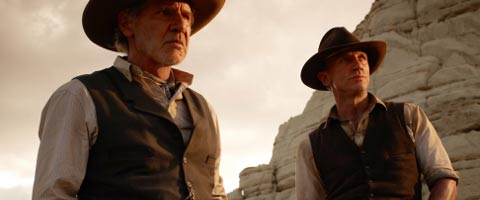
What was your method about bringing a balance to a culture of people who are suddenly thrust with unbelievable technology?
It's a much more acute example of what you deal with in every aspect of storytelling; which is "What Would it Really Be Like If." I think if you could answer that question effectively and I think Neil Simon said it too as a playwright. They're all facets of the same gem. Find the reality of that moment and play it as smart as you can. Whether it's Elf: What would it really be like if you grew up in a Rankin-Bass Christmas special and then you went to New York? What's the most extreme? Who should his dad be? The tendency is always to play down the rough edges. To me, you want to sharpen them and make it more extreme and then see what happens. So, with the western, what would it really be like is they saw them. There was a lot of discussion and nobody was unable to raise their hand and give a suggestion, whether it was the kid or Harrison Ford. "What would you think it would be?" "Well, it would be demons." It's not Apocalypto, where it's a magic thing, but they probably use that terminology but they're kind of savvy to technology, they would sense its technology of some sort.
They would sense it's technology of some sort. Then what would the American Indians feel? Well, every piece of technology that they've seen has been something from overseas that has been used to exterminate them. So, it's probably something related to the white man. To be able to quiet your mind and say, "What would this be like if this were to really happen?" That was Iron Man too. How would it really go down? What's the first thing you would do? That's why I like the first Spider-Man a lot, the beginning especially, because you have to learn to use it. To jump past that point and have him rescue people right away or fight crime, to me, is robbing the audience of the delicious experience of the learning curve of any of these things. To me, it's that transition that makes it exciting.
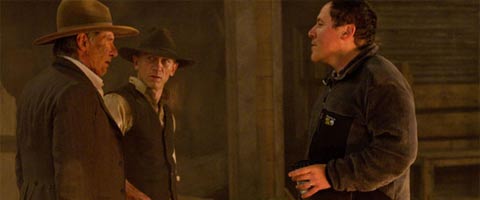
There's a lot of discussion about faith and the soul as sort of thing that fortifies them and keeps them from losing all hope and inspires them. That's something that maybe back in John Ford's day they might have gone to that, but in the modern Western, that's kind of been absent.
It might be where I am in my life, but fear and faith is a huge thing. I think it's part about being halfway through your life, hopefully, where you're as close to both ends and you sort of just get the whole picture. Life's scary and do you believe that there's something more than what you see on the surface. People coming together, whether it's in the Western, to carve out of wilderness where you could raise a family back when civilization was seen as very pure and a a good thing and you were bringing order to the chaos and the darkness. Now, it's changed and we see civilization as maybe a scarier thing. If you keep it just as the metaphor of what it represents in the Western, people are coming and sacrificing and a lot of these people are grizzled, world-weary people who've seen and dealt out death. To have them be able to redeem themselves through acts of selflessness, to me, is a big, big part of the Western and also, with the alien movies, they always seem to be about death and morning.
It's such a hard thing for us to deal with directly in a movie, but people are still fixated on it; it's always in the back of our minds. Whether it's Cocoon, or E.T dealing with divorce, or Close Encounters, which is a metaphor for, I think, the loss of the dad, who goes off in the spaceship. Even what J.J. just did, it's always, on some level, with people crossing over to the other world and how they contend with it and if they can find the bittersweet happiness in that. To me, those spiritual themes seem to exist natively in both of the genres. Also, his memory loss, that's a metaphor for trauma. When you suffer a loss, you always go through that and you have to come to terms with it before you can move on. The gunfighter movies are always about them coming to this Purgatory, they deal with this situation, and they're able to move on. So, I don't know if they audience ever really sees that. Certainly not the way we're going to market it, but you asked. I think it depends how old you are. I don't think my kind would know about it, I think he would just like to see them blowing up the hell out of aliens, but for us, we have to have an internal logic to the whole thing that brings an integrity to the mash-up.
There's some really optimistic stuff as far as the racism of the time. Where did that come from?
We're not revisionist historians here. There is a lot of talk about people killing people and the Apaches and the scalps. We started off with images from the Blood Meridian right off the top. It's a dark world. Harrison Ford's story about what he witnessed as a child with the atrocities committed upon the settlers and the Indians are saying all these terrible things have come from the white people ... and they're all right. Instead of making it like they're all playing nice together and they happen to be friends right off the bat ... even Harrison Ford and Adam Beach, who clearly have a very strong bond, stronger in many ways than he does with his own son, he's conflicted about that feeling. But yet, in his heart, he still looked after him like a son and is seen as such. So I think what's fun is to start them as far apart as you can and then, I think, it was Regan who said during the Cold War said that the only way the Russians and the Americans are going to get along is if aliens invade. A common enemy brings these people together and I think that came from what I was playing with when I was working a version of John Carter of Mars and there was this sense of very proud, stiff-necked people set in their differences that reluctantly come together and through that union are able to overcome odds and make the world a better place is a very moving theme.
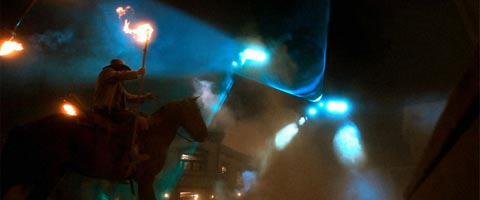
How much guts does it take to say to a major motion picture studio I want to make a $100 million movie about people making the moral choice to be better?
Your first job is to sell popcorn. So you can never lose sight of the fact that you have to make money back for the people who are giving you money. That being said, my boss is Steven Spielberg. He's a guy who's far more concern with that very thing. He's very comfortable with how commercial something is going to be. He made a Holocaust movie that you feel uplifted by without ever betraying the reality of the Holocaust. That, to me, is the highest degree of difficulty that I could come up with. He finds a way. People relate so much to what he puts out there that the commercialism of it is not the thing that he finds to be the challenge. I think what he finds to be the challenge is how you can bring an integrity to what you're doing while you're doing something that's commercial. That's the advantage of having a filmmaker as the head of a studio and I've never experienced anything like it. It was quite eye-opening.
Was he involved on a story beat level? Or would you look back and see he was carrying you?
Sure. He'd look at the script. He was involved in preproduction, he especially got involved with alien design and he had a lot of insight to offer. Then, he came in for close to a week during post-production and sat with us and challenge things or gave suggests, always in a very supportive way. Always with the pretext of "If you want it, it's here. If you don't want it, there's always a different way to go about it, but this is what I think." The vast majority of things that he said were very sophisticated and eye-opening. While we were shooting, neither he nor Ron were around and they both made themselves available in the beginning and in the end, they came in during the most important phase, I contend.
What alien features did Spielberg ask for?
We had one design that we really liked that was very similar to all the materials of the Kraken in Clash of the Titans. Even though the scale was much different, we went "Woah!" The way the teeth were, and we actually had six eyes at a moment. He was always making sure that you could identify that the alien had some aspect that was anthropomorphic enough to make you able to feel a personal connection between Jake and alien that he had issue with. That also comes from The Searchers. That's more a storytelling thing than an alien thing, but he had certain instincts about that that he was always gearing us towards and he was right. He was dead right.
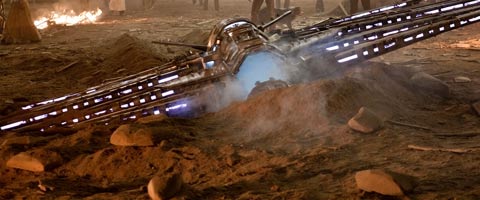
The casual movie-goer is going to see the title and be like, “Cowboys & Aliens? No contest, aliens." What was the process of developing a superior race that's also vulnerable?
Well, it's all about plausibility, right? You don't want to do this with a deus ex machina. You could totally get away with that in an alien movie. Look at War of the Worlds, they caught a cold and died. So, that's okay, that's part of our history, but that's the fun. Isn't that what movies are always? How is David & Goliath? There's no way that kid's going to play football for Notre Dame. But it's plausible ... and the fact that it's based on a true story makes it even more plausible, but the plausibility of the Spartans making that stand, isn't that always the story that you want told? You want say, "how the hell are they going to get out of this one?" and then you want to know how Robin gets out of the giant clam. You always want that cliffhanger and you always want the storytellers, through ingenuity, bring you out it in a way that you say, "Y'know what? I enjoyed it enough and it's plausible enough that I buy it and that held my attention for a moment." It's up to you guys to tell me, but I think we've earned the thing; that there was enough of a game balance that it makes sense. I think the suggestion that Steven made before I came onboard was to have a guy walk into a bar with blaster. Now, had that suggestion not come into it, and I don't think that's even in the comic, if that was not part of it, I don't think you could have tipped those scales. Also the fact the fact they're a scout party, and the fact that they're probably an inferior race that hibernates during sub-light travel to get a certain planet, so you just can't call on the radio and call in an airstrike.
Is that like a real thing?
I was thinking there was something really interesting about Planet of the Apes that everybody "jumps" now. It's too hard of a thing to deal with. "Okay, we gotta destroy the Death Star. Let's go into a low birth for four years and get to it." In Planet of the Apes, when they first came to the planet, my parents explained to me, "Oh that person is old because their thing cracked and they aged in the suspended animation." I think there's other life out there, I think the reason they're not here is because it's too far away. It's like the ocean. Also, I was thinking like the Conquistadors or the settlers or the Europeans travelling across broad oceans to get here. We wanted to keep that metaphor alive for the Western part of it. Also, for the metaphor of higher technology coming and just like we did to the Native Americans, they're doing to us, which is a theme from the comic that I thought was interesting. What happens when a lower tech race has to defend itself from higher tech settlers? I thought if they were travelling from a far distance, that would explain why there weren't others coming as soon as you messed with one. And, probably through genetic engineering, you could come up with a specific race that is geared toward collecting information, scouting, being tough, and creating a hive, but there are probably smarter aliens further back. I don't think they're all like this. That's where my head was at.
Is there a backstory to why they want gold?
If you look at the mythology of aliens, there's a lot about gold. It's about them coming for gold; whether that's a simplification or not. If you think of Chariot of the Gods, there's this reoccurring theme of gold. If you also say in addition to no faster-than-light travel, that nobody's created transmutation, gold is created in very trace amounts in supernova, so it would be very rare anywhere and rarity would lead to value. It's also a useful, malleable, ductile material that might be used by higher order of technology and if we ever go anyplace else, it would be like Outland. We'd be belters, we'd be mining for resources from other places. So, they would probably have the same logic. Also, most importantly, if works very well for the metaphor of The Treasure of the Sierra Madre and the gold. It's the intersection of where those two things lie and we address it pretty square on. It's either going to be there's here to eat us, which seems silly to me. It's the best choice of all the choices and the one I felt was the most poetic. And then to study us, to get into the whole vivisection mythology of aliens as well, we wanted to encapsulate as many of the images of what people think the aliens do when they're here and then, also, to make it a bit horrific.

Eric Eisenberg is the Assistant Managing Editor at CinemaBlend. After graduating Boston University and earning a bachelor’s degree in journalism, he took a part-time job as a staff writer for CinemaBlend, and after six months was offered the opportunity to move to Los Angeles and take on a newly created West Coast Editor position. Over a decade later, he's continuing to advance his interests and expertise. In addition to conducting filmmaker interviews and contributing to the news and feature content of the site, Eric also oversees the Movie Reviews section, writes the the weekend box office report (published Sundays), and is the site's resident Stephen King expert. He has two King-related columns.
